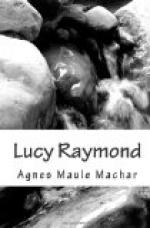“Well, I hope I shall never have to, for I should hate it!”
However, when Lucy was fairly at work on the little frock, Stella good-naturedly offered to help her a little, though, never having been trained to perseverance in anything, her assistance was not very efficient.
Bessie Ford had gone home from Sunday school with her head turned by hearing some foolish talk about her dress. Alas! how often it is that Sunday scholars, on leaving the school, instead of giving one thought to the divine truths they have been hearing, allow their attention to be absorbed with the petty frivolities in which their thoughts run wild!
“Mother,” said Bessie, after she had duly announced the intended picnic, “can’t I have a new pink sash for my white frock? Nancy Parker is going to have ever so many new things.”
“No, child,” said her mother, “you don’t need a new sash. Your frock looks quite well enough without one. But I’ve been thinking you’d be the better of a new hat, for the one you have looks a little brown. And as you’ve been a pretty good girl, and a deal less forgetful of late, I wouldn’t mind getting you a new hat, if you’ll hurry and finish up that plain sewing you’ve had in hand so long. It’s time it was done and put away.”
Bessie looked a little disappointed. The new hat was not so attractive as the sash would have been. Suddenly her mother’s remark on the brownness of her hat suggested the image of Nelly’s tattered, dingy one, which she had noticed that afternoon.
“What would you do with my old hat, mother,” she said, “if I get a new one?”
“I don’t know. You’ve your sun-bonnet for wearing about the farm. Put it by for Jenny, perhaps,” suggested the thrifty Mrs. Ford.
“Might I give it to Nelly Connor, mother? Hers will hardly stay together.”
Mrs. Ford had never seen Nelly, but she knew something of her forlorn situation. “I’m sure,” she said, “I shouldn’t mind if you did. I dare say it would be charity to her, poor thing.” And it occurred to her to think whether she, a well-to-do farmer’s wife, had been as abundant in deeds of charity as she might have been.
Bessie considered the matter settled, and next day set to work with renewed zeal on the “plain sewing,” which had been getting on very languidly; for Bessie was not fond of long, straight seams, or of sitting still for any length of time. She set herself a task as she took her seat under the spreading butternut-tree; and Jenny and Jack came to beg for “a story.” Bessie’s story-telling powers had been largely developed of late, to make the Sunday lessons she had begun to give the restless little things more palatable to them. Only the promise of “a story” could fix their attention long enough to commit to memory a simple verse. And her powers once found out, she soon had demands upon her for stories to a greater extent than her patience was always equal to satisfying.




